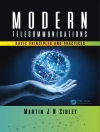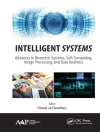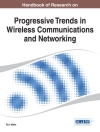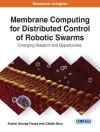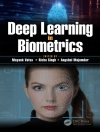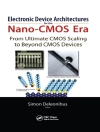The book is a collection of best selected research papers presented at International Conference on Cyber-Technologies and Emerging Sciences (ICCTES 2021), organized by Graphic Era Hill University, Bhimtal Campus, Uttarakhand, India, during 17 – 18 December 2021. The book covers state-of-the-art applications, innovative methods, and analyze the unexplored and unsolved challenges to establish the relative solutions to advance the existing applications and theories of Cyber-Technologies and Emerging Sciences.
Daftar Isi
A Novel Meta-classifier Framework Approach for Land Use Land Cover Classification2.- Survey of Surveillance of Suspicious Behavior from CCTV Video recording.- Security Attacks, Requirements and Simulative Analysis of Qo S in WSN.- Breast Cancer Prediction Using Greedy Optimization and Enlarge C4.5.- Meta-Analysis of Nature Inspired Hybrid Cuckoo Algorithm.- Investigating factors influencing retention in MOOCs.- Green Energy Powered by Smart Grids: A Business Model for Long Term Sustainability.- Cloud based “Energy Aware” routing protocol for predetection and its prevention of Fault Tolerance.- Unmasking the Malware using Android Debug Bridge.- Blockchain and Competitive Business Performance.- Cloud network communication performance Improvement using a Stochastic Bandwidth Allocation and Swam Optimization algorithm.- Comparison of Read Stability and Write Ability of Low Power Nanometric SRAMs.- Forecasting Mental Disorders through Aspect Identification from Social Media Posts.- Topic Popularity Prediction Using Similarity Graph on Twitter.- Bolster Shark Smell Optimization Routing Protocol (BSSORP) For Routing in Underwater Wireless Sensor Networks.- Intrusion Detection System based on Feature Reduced Back Propagation Neural Network using Ant Colony Optimization.- Machine Learning and Sensor Roles for Improving Livestock Farming using Big Data.- Sentimental Analysis on E-learning Videos for Learner’s Opinion using Machine Learning Methodology – Support Vector Machine.- TLRNN: Two Level RNN Based Personalized Recommendation in Tourism Domain.- RTHMs – Real Time Health Monitoring System.- Deployment of Cellular Application Using Flutter for Covid-19 Visualization.- Enhancing Agricultural System And Agro Food Transportation Management Using Io T.- Dynamic and Unified Approach to Distinguish Malicious URL using LSTM.- Deep Learning for Performance Enhancement Robust Underwater Acoustic Communication Network.- Modeling and Control of FOPDT Modeled Processes – A REVIEW.- Early Detection of Autistic children using Wrapper-based Feature Selection Technique.- Medical Insurance Cost Prediction Using Machine Learning Algorithms.- Scope and Challenges of Artificial Intelligence in Health Care of India.- Fs-Set Functions-Images.- Offline Handwritten Signature Verification Using Decision Tree.- Iot In Healthcare In Times Of Pandemic (COVID-19).- A Novel Approaches for High Security in Finger Vein Based Authentication System in Military Forces.- Bow Type Active Frequency Selective Surface for Satellite Communication.- Productive Study Routine Generator.- Semantic Web Undertaking Effort Estimation Utilizing Co Como II SVM and Neural Network.- Design and Method of 16.24 GHz Microstrip Network Antenna using Underwater Wireless Communication Algorithm.- Io T Security using Machine Learning Techniques.- Performance Analysis of Sign Language Recognition System using Hybrid Feature Descriptor.- Research trends and applications of artificial intelligence in 3D printing-A Scientometric analysis.- Bibliometric Study and Visualisation of Research Trends in Hybrid Blockchain Technology.- Detection of Unauthorized Access Points based on Machine Learning Techniques.- GAIT Recognition Technique using Gait Energy Decomposition method.- Survey of Comparative Analysis of Different Routing Protocols in MANETs: Qo S.- Comparative Analysis of Energy Efficiency of Logic Gates on FPGAs.- To combat the menace of Forest Fires at Nainital and Almora District in Uttarakhand using Internet of Things.- Frequency control using captive generation and demand response.- load frequency control in multiarea power system using TID control scheme.- Implementing Internet of Things driven Water Tank Controlling.- Utilizing Technology and Management of Fog Computing.
Tentang Penulis
Dr. Sudhanshu Maurya, Member IEEE, Post-Doctoral Researcher, School of Computer & Communication Engineering, Universiti Malaysia Perlis (Uni MAP), Malaysia. He has been designated as Assistant Professor in School of Computing, Graphic Era Hill University, Bhimtal Campus, Uttarakhand, India. Dr. Maurya has completed his Ph.D. in Computer Science, special focus on “Security and Privacy aspect of Mobile Cloud Computing”. He acquired a master’s degree in Computer Science with a specialization in Artificial Intelligence from Central University of Rajasthan, Rajasthan. He has completed his bachelor’s degree in Information Technology from HNB Garhwal Central University, Uttarakhand. He has also contributed as a Research Fellow at NIT Surat. His area of research is dedicated to Cloud Computing, Io T, and Machine Learning. He has authored / coauthored 2 course books, 2 international Patents (Granted), 5 Indian patents and more than 45 research papers indexed in SCOPUS, Web of Science, ACM, IEEE &UGC Care Approved Journals.
Sateesh K. Peddoju is currently working as an Associate Professor at the Indian Institute of Technology Roorkee, India. He is the Senior Member of ACM and IEEE, and recipient of Cloud Ambassador Award from AWS Educate, IBM SUR Award, Microsoft Educate Award, university merit scholarship, best teacher award in his previous employment, best paper/presentation awards, and travel grants. To his credit, he has one book, edited three books, and many publications on top-tier conferences and journals. He has received several grants from different funding sources. He is guiding many doctoral, master’s, bachelor’s, and intern students. He has organized many conferences, acted as the Program Chair and General Chair for many conferences. He has been contributing to society as a committee member at national and international forums. His research interests include Cloud Computing (Cloud, Edge, and Fog), Ubiquitous Computing (Mobile, Pervasive, and Io T), and Security (Network, Cloud, Io T, Mobile, and Blockchain).
Prof. Ir. Ts. Dr. R. Badlishah Ahmad is Professor in Computer and Communication System at Universiti Malaysia Perlis (Uni MAP). He was appointed as Vice Chancellor at Universiti Malaysia Perlis (Uni MAP), Malaysia (15 May 2019 – 27 March 2021) and Deputy Vice Chancellor at Universiti Sultan Zainal Abidin (Uni SZA) since March 2017 to May 2019. He was the Dean at the School of Computer and Communication Enginering and also the Head of Embedded Computing Research Cluster, Universiti Malaysia Perlis (Uni MAP) since January 2005 to February 2017. He obtained Bachelor of Engineering with Honors (B.Eng. (Hons)) in Electrical & Electronic Engineering from Glasgow University in 1994. He continued his Master of Sciences (M.Sc.) in Optical Electronic Engineering at University of Strathclyde and graduated in 1995. He then continues his study at Ph D level at the same university and completed in 2000. Hehas authored and coauthored more than 375 conferences / journal papers, more than 3500 citations, i10-index 99 and h-index is 26. His research interests are in computer and telecommunication network modelling, optical networking and embedded system based on GNU/Linux.
I. Chihi is a Guest Professor in Electrical Engineering, University of Luxembourg, The Faculty of Science, Technology and Medicine (FSTM) and an Associate Professor on Automation and Industrial Computing at the National Engineering School of Bizerta, Tunisia (ENIB) and member of the Laboratory of Energy Applications and Renewable Energy Efficiency (LAPER) of University Tunis El Manar. She obtained her Ph D degree and University Habilitation from National Engineering School of Tunis, Tunisia (ENIT), in 2013 and 2019, respectively. Her research area is based on intelligent modeling, control and fault detection, of complex systems with unpredictable behaviors. Since 2020, she is Guest Associate Editors in the IEEE Journal of Emerging and Selected Topics in Power Electronics, Special Issue on: Machine Learning & Deep Learning based Power Conditioning Systems for Smart Grid.


